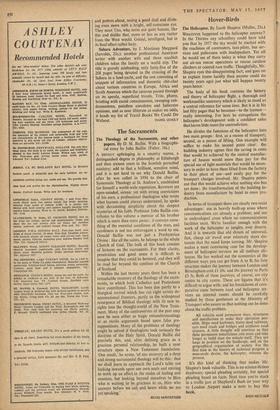The Sacraments
The Theology of the Sacraments, and other papers. By D. M. Baillie. With a biographi- cal essay by John Baillie. (Faber, I 6s.)
A DEVOUT upbringing in a country manse, a distinguished degree in philosophy at Edinburgh and then sixteen years in the Scottish parochial ministry; add to that a brilliant, sensitive mind, and it is not hard to see why Donald Baillie, after he was called in 1934 to the chair of Systematic Theology at St. Andrew's, established for himself a world-wide reputation. Reverent yet open-minded, eirenic yet with strong convictions of his own, a professional theologian who wrote what laymen could always understand, he spoke with devastating simplicity about the deepest mysteries of his faith. Professor John Baillie con- tributes to this volume a memoir of his brother which is more than mere pietas: it conveys some- thing of the essential saintliness of the man, and saintliness is not too extravagant a word to use. Donald Baillie was not just a Presbyterian Divine: like all the saints, he belongs to the whole Church of God. The bulk of this book consists of lectures on the sacraments. For their clarity, penetration and good sense it is difficult to imagine that they could be bettered, and they will be read far beyond the confines of the Church of Scotland.
Within the last twenty years there has been a remarkable recovery of the theology of the sacra- ments, to which both Catholics and Protestants have contributed. This has been due partly to a liturgical revival which has cut right across de- nominational frontiers, partly to the widespread resurgence of Biblical theology with its new in- sights into the thought-world of the New Testa- ment. Many of the controversies of the past may now be seen either as tragic misunderstandings or as sterile arguments based upon false pre- suppositions. Many, of, the problems of theology might be solved if theologians took seriously the doctrine of the Holy Spirit. Donald Baillie did precisely this, and, after defining grace as a gracious personal relationship, he built a sane structure upon a New Testament foundation. 'One result,' he wrote, 'of our recovery of a deep and strong sacramental theology will be this : that we shall learn to approach the Lord's table not looking inwards upon our own souls and striving to work up an effect. in the realm of feeling and emotion, but looking beyond ourselves to Him who is waiting. to bengracious to us, Him who answers before we call and hears while we are yet speaking.'
HUG!! MONIEFIORE


































 Previous page
Previous page